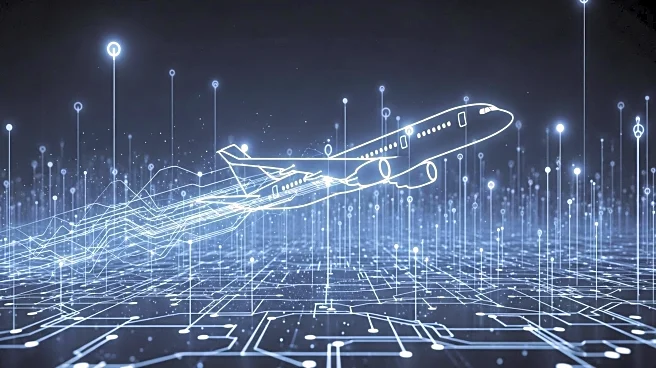What's Happening?
Lufthansa has announced plans to cut 4,000 full-time equivalent roles worldwide by 2030 as part of a broader restructuring strategy aimed at increasing profitability and efficiency. The company is focusing on eliminating primarily administrative roles, with the majority of these cuts occurring at its home base in Germany. This move is part of Lufthansa's strategy to leverage digitalization and artificial intelligence to streamline operations and reduce duplication of work. The announcement was made during the company's Capital Markets Day in Munich. Lufthansa is not alone in this approach; other companies like Klarna and Salesforce have also cited AI as a key factor in their workforce reductions.
Why It's Important?
The decision by Lufthansa to cut jobs and integrate AI into its operations highlights a significant trend in the business world where companies are increasingly relying on technology to enhance efficiency and reduce costs. This shift has broad implications for the labor market, particularly in administrative roles that are more susceptible to automation. While AI can lead to increased productivity and profitability for companies, it also raises concerns about job displacement and the need for workforce reskilling. The broader economic impact includes potential cost savings for companies and increased competitiveness, but also challenges in managing the transition for affected employees.
What's Next?
Lufthansa's restructuring plan is set to unfold over the next several years, with the company aiming to achieve an adjusted operating margin of 8%-10% by 2028. The airline also expects to generate an adjusted free cash flow of more than 2.5 billion euros annually. As the company implements these changes, it will be crucial to monitor the impact on its workforce and the effectiveness of AI integration in achieving the desired efficiency gains. Stakeholders, including employees, investors, and industry analysts, will be watching closely to see how Lufthansa navigates this transition and whether it can meet its financial targets.
Beyond the Headlines
The move by Lufthansa to cut jobs in favor of AI-driven efficiency raises ethical and cultural questions about the future of work. As companies increasingly turn to technology to replace human labor, there is a growing need to address the social implications of such changes. This includes ensuring that displaced workers have access to retraining opportunities and that the benefits of technological advancements are shared broadly across society. Additionally, the reliance on AI in decision-making processes poses challenges related to transparency and accountability, which companies will need to address to maintain trust with stakeholders.









